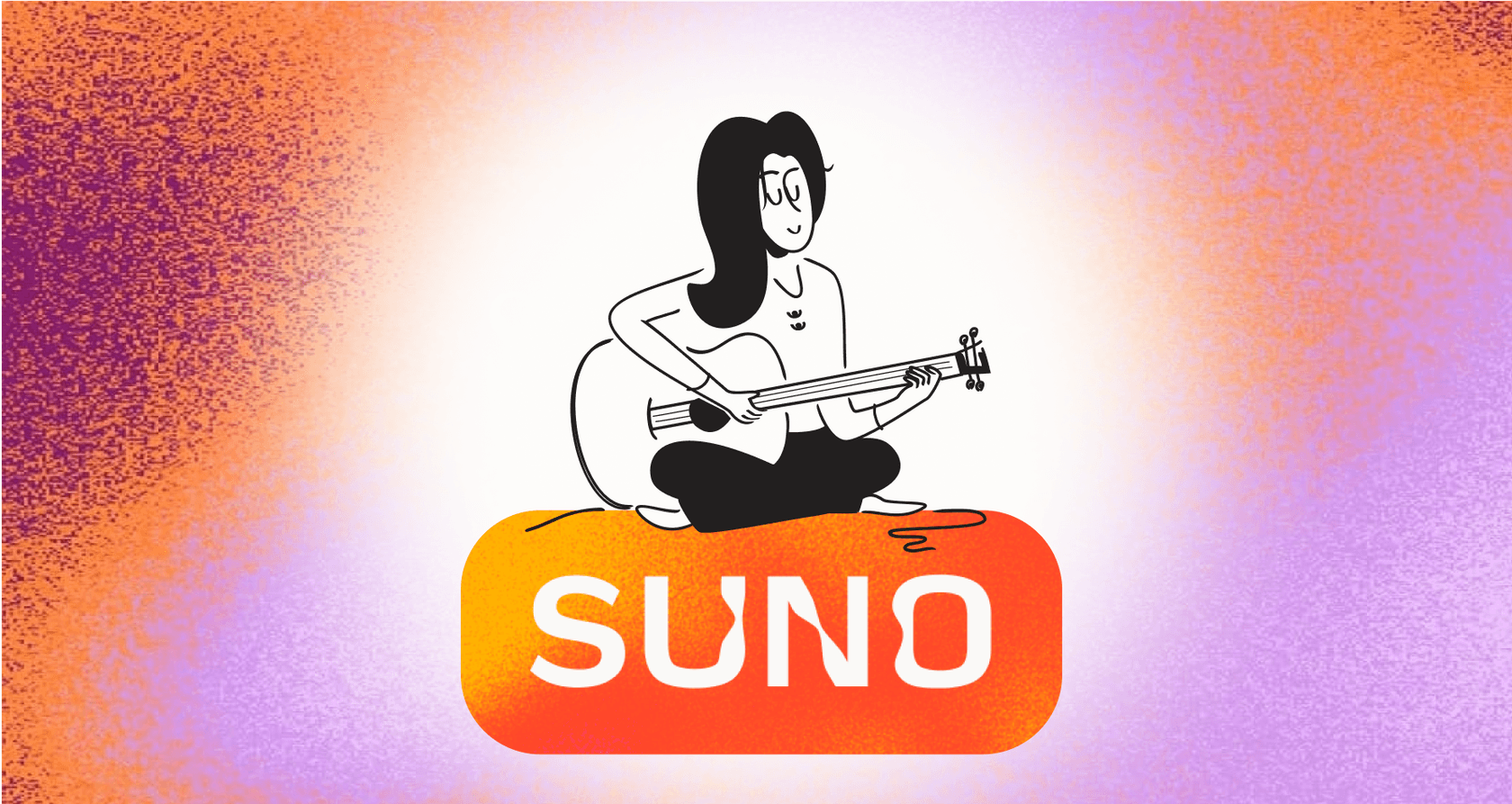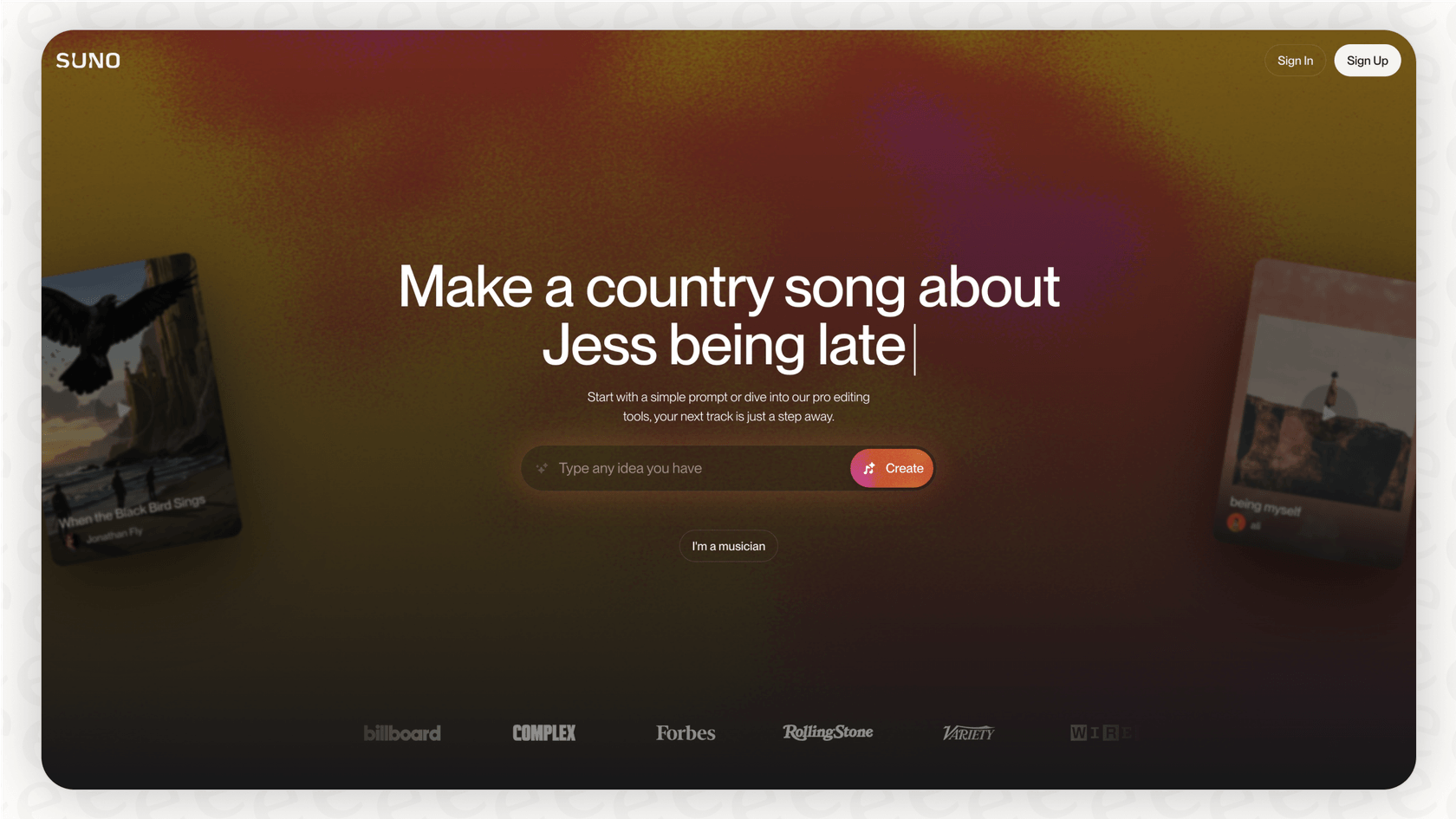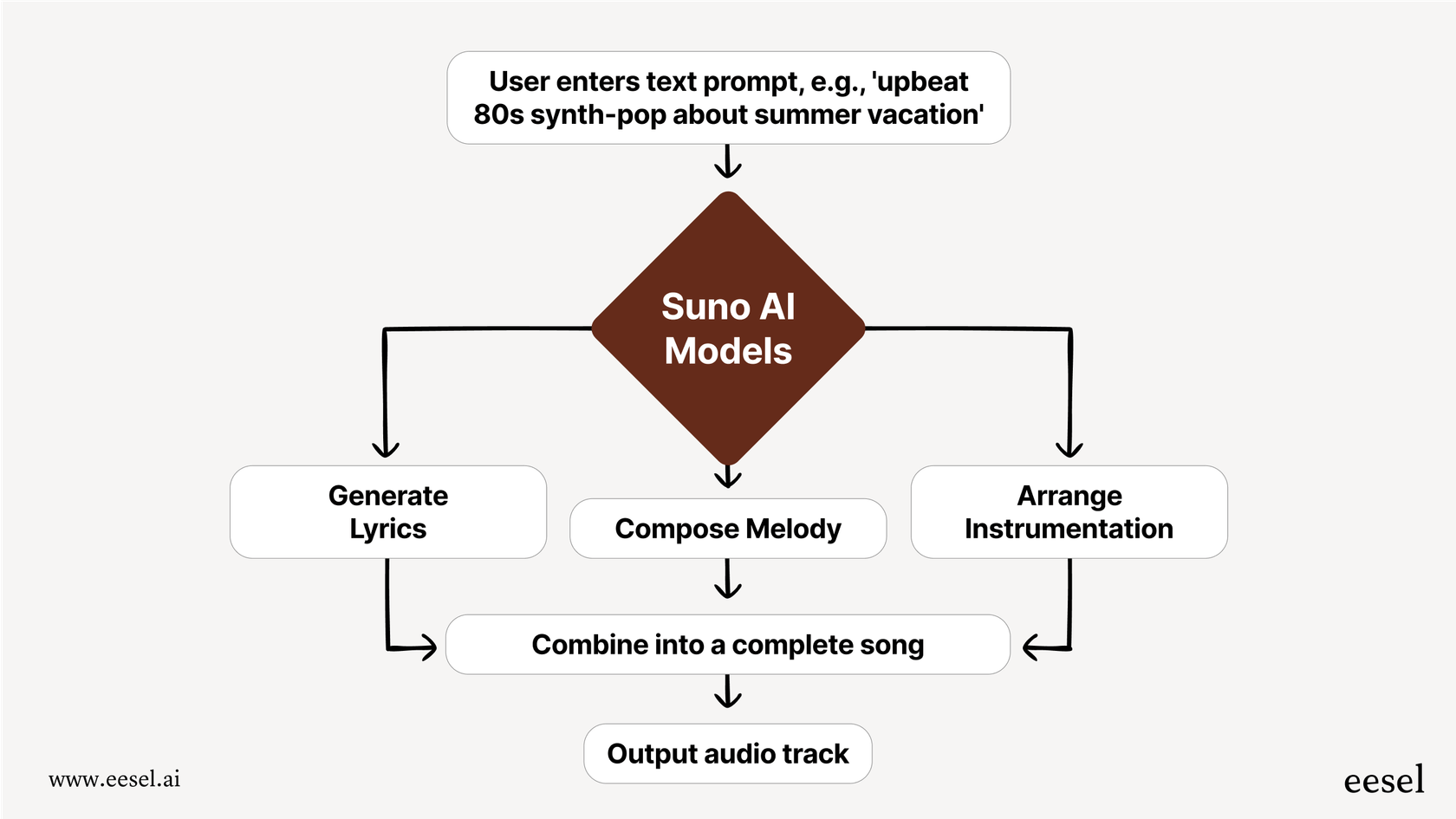
It feels like generative AI is everywhere these days. We’ve seen it write decent essays, whip up incredible images from a few words, and even code bits of software. Now, it's writing entire songs. The tool leading the charge in this new creative space is Suno, which has been all over social media for its wild ability to generate music, vocals, lyrics, and all, from a simple text prompt.
So, what exactly is Suno? How does it actually work, what can you do with it, and what are the controversies brewing around it? In this article, we’ll give you a straight-up, balanced look at the platform. We'll cover its features, pricing, and the big conversations it’s starting about creativity and AI ethics. We'll also dig into how this kind of fun, creative AI is a world away from the controlled, reliable AI that businesses need to get work done.
What is Suno AI?
At its heart, Suno is an AI tool that generates music. You feed it a text prompt, and it spits out an original song with vocals, lyrics, and a full band behind it. The company says its goal is to make "high-quality music creation accessible to all," which basically means you don't need to know a single chord or how to read music to make something that sounds like a song.

People are using it for everything from making silly songs about their cats to helping serious musicians break through a creative block. You can use it on the web or through its mobile app, which has earned a stellar 4.9-star rating on the Apple App Store and a 4.8 on the Google Play Store. One App Store reviewer called it "an amazing gift of music," saying it can create songs that "fully capture... anything I might wish to express."
How Suno works: From prompt to song
Getting from a simple idea to a finished track in Suno is surprisingly easy, even if the tech doing the heavy lifting is anything but. Let's walk through how it all comes together.
The generation process
It all starts with a text box. A user types in what they're imagining, something like "upbeat 80s synth-pop song about summer vacation," and picks a genre. From there, Suno's AI model takes over, figuring out the prompt to generate lyrics, a melody, and all the instrumental parts.

If you already have lyrics you love, you can paste them in and have the AI compose the music to fit. The platform uses a few different AI models, and the newer versions like v5 generally deliver better audio quality and cleaner sound, a detail pointed out in a review by The Verge.
Key creation features
Suno has more than just one trick up its sleeve. Here are a few of the tools you can play with to shape your song:
-
Text-to-music generation: This is the main attraction, where you just describe the song you want to hear.
-
Instrumental mode: If you’re not looking for vocals, you can have it generate purely instrumental tracks.
-
Custom lyrics: You can bring your own lyrics to the table and let Suno act as your backing band.
-
Song extension and remixing: If you're on a paid plan, you can make your songs longer or remix existing tracks to give them a new vibe.
-
Stem extraction: This is a big one for anyone serious about music production. On the Pro plan, you can export individual vocal and instrument tracks as WAV files. You can then pull these "stems" into professional software like Ableton or Logic to tweak them further.
Suno pricing and plans explained
Suno operates on a freemium model that uses credits. You get a set number of credits to make songs, and if you run out, you can upgrade to a paid plan. Generating one song usually sets you back 5 credits.
Here's a quick look at their plans, based on their official pricing page:
| Plan | Monthly Price (Billed Yearly) | Credits | Key Features |
|---|---|---|---|
| Free Plan | $0 | 50 credits per day (10 songs) | Access to v3.5 model, no commercial use rights, shared queue. |
| Pro Plan | $6/month | 2,500 credits per month (500 songs) | Access to latest models (v5), commercial use rights, priority queue, stem extraction. |
| Premier Plan | $12/month | 10,000 credits per month (2,000 songs) | All Pro features, higher credit limit. |
A couple of things to keep in mind: your credits don't roll over to the next month. Also, the right to use your songs commercially is tied to having an active subscription. If you cancel, you lose those rights for any new music you generate.
The controversies and limitations of Suno
Like pretty much every powerful AI tool that’s popped up recently, Suno has kicked up its fair share of dust. The technology is impressive, no doubt, but it also raises some tough questions.
The copyright debate
The biggest issue hanging over Suno is the accusation that it trained its AI models on copyrighted music without getting permission from the artists. This has caused a huge backlash online, with some musicians on Reddit calling the practice flat-out "stealing." A report from Music Business Worldwide mentioned that the company admitted to training its AI on copyrighted songs, which has led to lawsuits from major record labels. This whole debate gets to the core of how generative AI is built and brings up some serious ethical questions about who owns what.
Is the music any good?
Legal headaches aside, there's also the simple question of whether the music is actually good. While the songs can sound polished and well-produced, a lot of people feel they're missing a human touch. The Verge review called it "technically impressive, but still soulless," noting that the vocals often sound "too close to perfection to be believably human." That feeling is shared by a lot of users, with one Redditor putting it bluntly: It seems that for now, the messy, emotional, and imperfect parts of a human performance are still something AI can't quite replicate.
This video offers a live reaction to music generated by Suno V5, giving a real-time perspective on its quality.
Unpredictability and lack of control
For people trying to use the tool, one of the main frustrations is the lack of control. The AI can completely misunderstand your prompt or create something totally different from what you had in mind. Some app store reviews complain that the "reuse style" feature often just generates a brand-new sound instead of sticking to the original, which makes it hard to be consistent. While this randomness can be fun if you're just experimenting, it’s a big problem if you're trying to create something specific for a project.
From creative tools to business solutions: The need for controlled AI
The very things that make Suno a fun creative toy, its unpredictability and "black box" nature, are exactly what make it a terrible fit for a business. Companies can't risk using an AI that might go off-script, give different answers every time, or is built on a legally shaky foundation. In the business world, especially when you're talking to customers, you need accuracy, reliability, and total control.
This is where a totally different kind of AI comes into play. For businesses, AI can't be a random song generator; it needs to be a precise, trainable tool that works within strict boundaries. Platforms like eesel AI are built to solve this exact problem. They give you a secure, customizable, and transparent AI that plugs into your existing workflows, turning the raw power of AI into something you can actually count on.
Why businesses choose a platform like eesel AI
When the goal is to get things done efficiently and deliver consistent results, businesses look for platforms that solve the big problems you see in open-ended creative tools like Suno.
- You're in the driver's seat: Unlike the wild-card nature of some generative AIs, eesel AI lets you build a completely custom workflow. You get to define the AI's exact personality, the specific tasks it's allowed to handle, and which customer questions it should tackle. This means it always stays on-brand and on-task, and knows when to pass a conversation to a human.

- It learns from your stuff, safely: Instead of training on a massive, random pile of data from across the internet, eesel AI securely connects to your company's own internal knowledge base. It learns from your past support tickets, help articles, and internal docs in places like Confluence or Google Docs. This ensures that every answer is accurate and relevant to your business, not just some generic info from the web.

- You can test it risk-free: Rolling out a new AI system can feel like a gamble. eesel AI takes the guesswork out of it with a powerful simulation mode. Before the AI ever talks to a real customer, you can run it on thousands of your past support tickets to see how it performs. This gives you clear, data-driven predictions on how many issues it will solve and how much you'll save, so you can go live with confidence.

The two paths for AI from Suno to business tools
Suno represents the wild, exciting, and sometimes messy frontier of generative AI. It's a fascinating creative tool that's pushing boundaries and sparking important conversations about art, ethics, and technology. It’s a peek into a future where anyone can be a music maker.
At the same time, a more practical, down-to-earth future for AI is already here for businesses. This future is being shaped by platforms like eesel AI, which are all about control, security, and getting measurable results, not just random discovery. It’s about using AI as a reliable tool to solve real-world problems.
While the story of creative AI is still being written, businesses today can already use controlled, predictable AI to streamline their work, improve their customer experience, and actually grow.
If you're looking to bring AI into your customer support with full control and transparency, check out what you can build with eesel AI.
Frequently asked questions
Suno is an AI tool that generates full songs, including vocals, lyrics, and instruments, from a simple text prompt. Its goal is to make high-quality music creation accessible to everyone, regardless of musical experience.
Yes, Suno offers several customization features. You can provide your own lyrics, generate purely instrumental tracks, extend existing songs, or remix them on paid plans. Pro users can also extract individual stems for further editing.
Suno operates on a freemium model with a Free Plan, Pro Plan, and Premier Plan. Paid plans offer more credits for song generation, access to the latest AI models, commercial use rights, and priority processing.
While Suno's music is technically impressive, some users find it lacks a "human touch" or can be "soulless," especially the vocals. The AI can also be unpredictable, sometimes misunderstanding prompts or failing to maintain a consistent style.
Commercial use rights for music generated by Suno are tied to an active Pro or Premier subscription. If your subscription lapses, you lose commercial rights for any new music generated. There are also ongoing legal debates regarding Suno's training data and copyright.
Suno is a creative, often unpredictable AI designed for broad music generation, while business tools like eesel AI are built for precision, reliability, and control. Business AI focuses on secure, custom workflows, learning from proprietary data, and providing measurable results for specific tasks.
Share this post

Article by
Stevia Putri
Stevia Putri is a marketing generalist at eesel AI, where she helps turn powerful AI tools into stories that resonate. She’s driven by curiosity, clarity, and the human side of technology.







